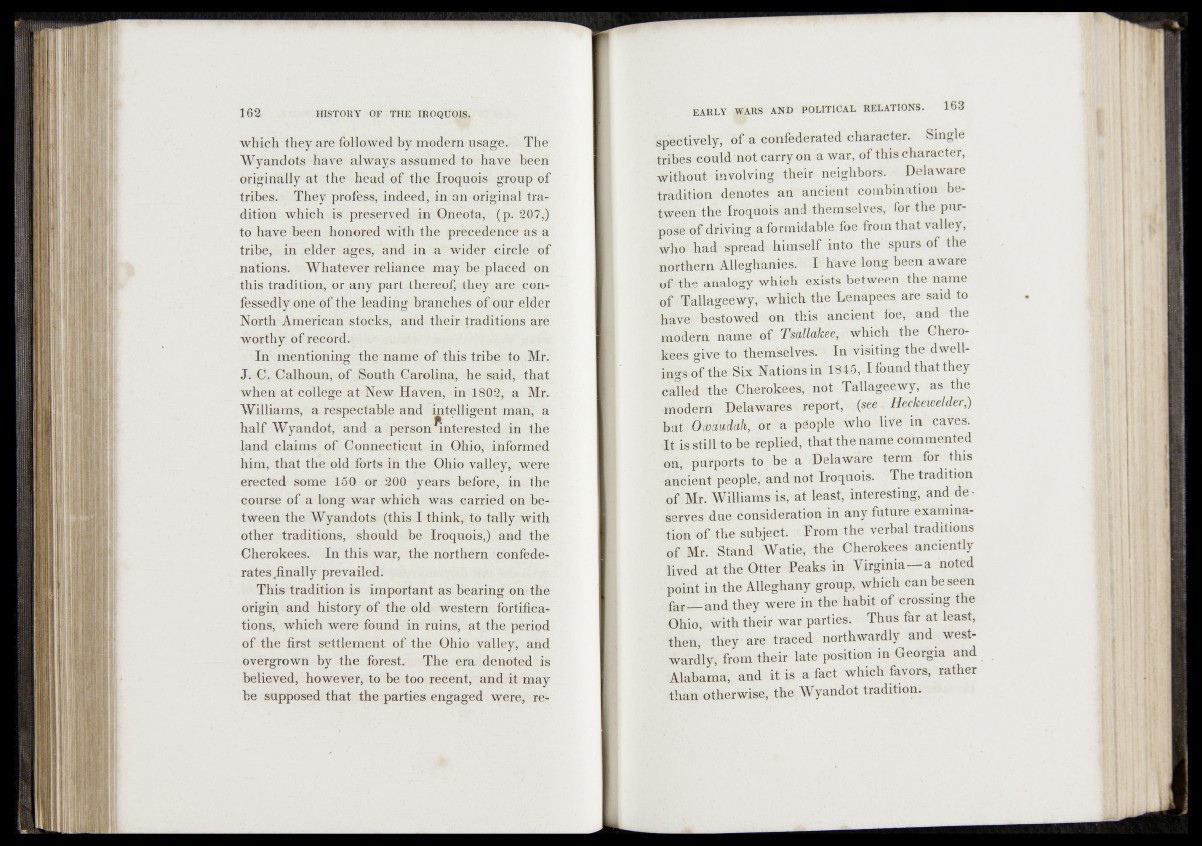
which they are followed by modern usages The
Wyandots have always assumed to hate been
originally at the heud of the Iroquois group of
tribes. They profess, indeed, in an original trav
ditron which is preserved in Oneota, (p, 2W,)
to have been honored with the precedence as a
tribe, in elder ages, and in a wider circle of
nations. Whatever reliance may be placed on
this tradition, or any part thereof, they are con-
lessediy one of the leading branches of our elder
North American stocks, and their traditions are
worthy of record.
In mentioning the name of this tribes to ,Mr.
J. C. Calhoun, of South Carolina, he said's that
when at college at New Haven, in i a Mr.
Williams, a respectable and intelligent man, a
half Wyandot, and a person interested in-the
land claims of Connecticut in Ohio, informed
him, that the old forts in 1 he Ohio valley. Were
erected some 150 or 200 years before, in thq
course of a long war which was. carried on bo*
tween the Wyandots (this I think,To tally with
other traditions, should be Iroquois,) and the
Cherokees. In this war, the northern confederates
.finally prevailed.
This tradition is important as. bearing on the
origin and history of the old western fortifications,
which were found in ruins, at the period
of the first settlement, of the Ohio valley, and
overgrown by the forest. The era denoted is
believed, however, to be too recent, and it may
he supposed that the parties engaged were, respectively,
of a confederated character. Single
tribes could not carry on a war, of this character,
wilhoHt involving ‘their neighbors. Delaware
tradition demotes an acieieilt combination between
the Iroquois and themselves, for The purpose
of driving a forniidable, foe from that valley,
who? had spread himself into, the spurs of the
northern Alleghhnies; I have long been aware
of.the analogy which exists between the name
0f , Tallagbewy,' which the Jienapees, are said to
hav^’hestowed on this, ancient toe, and the
modern name of Tsallakee, which the Cherokees
give to themselves/ In visiting the dwellings
of the Six Nations in 18 4 5 , I found that they
called the- Cherokees, not Tallageewy, as the
.modem Delawares report, { s e e - Heckewelder,)
but Owdudah, or a people who live in caves.
If is still to be replied, that the name commented
on, purports to be a Delaware term for this
ahclent people, and not Iroquois. The tradition
Of Mr. Williams is, at least, interesting, and deserves
due consideration in any future examination
of the subject: ■ From the verbal traditions
of Mr. Stand Watie* the Cherokees anciently
lived at the Otter Peaks in Virginia—a noted
paint in the AHeghahy group, tvhieh can be seen
farand. they were in the habit of crossing the
Ohio, with their war parties.;' Thus far at least,
then, they are traced northwardly and west-
wardly, from their late position in Georgia and
Alabama, and it is a fact which favors, rather
than otherwise, the Wyandot tradition.